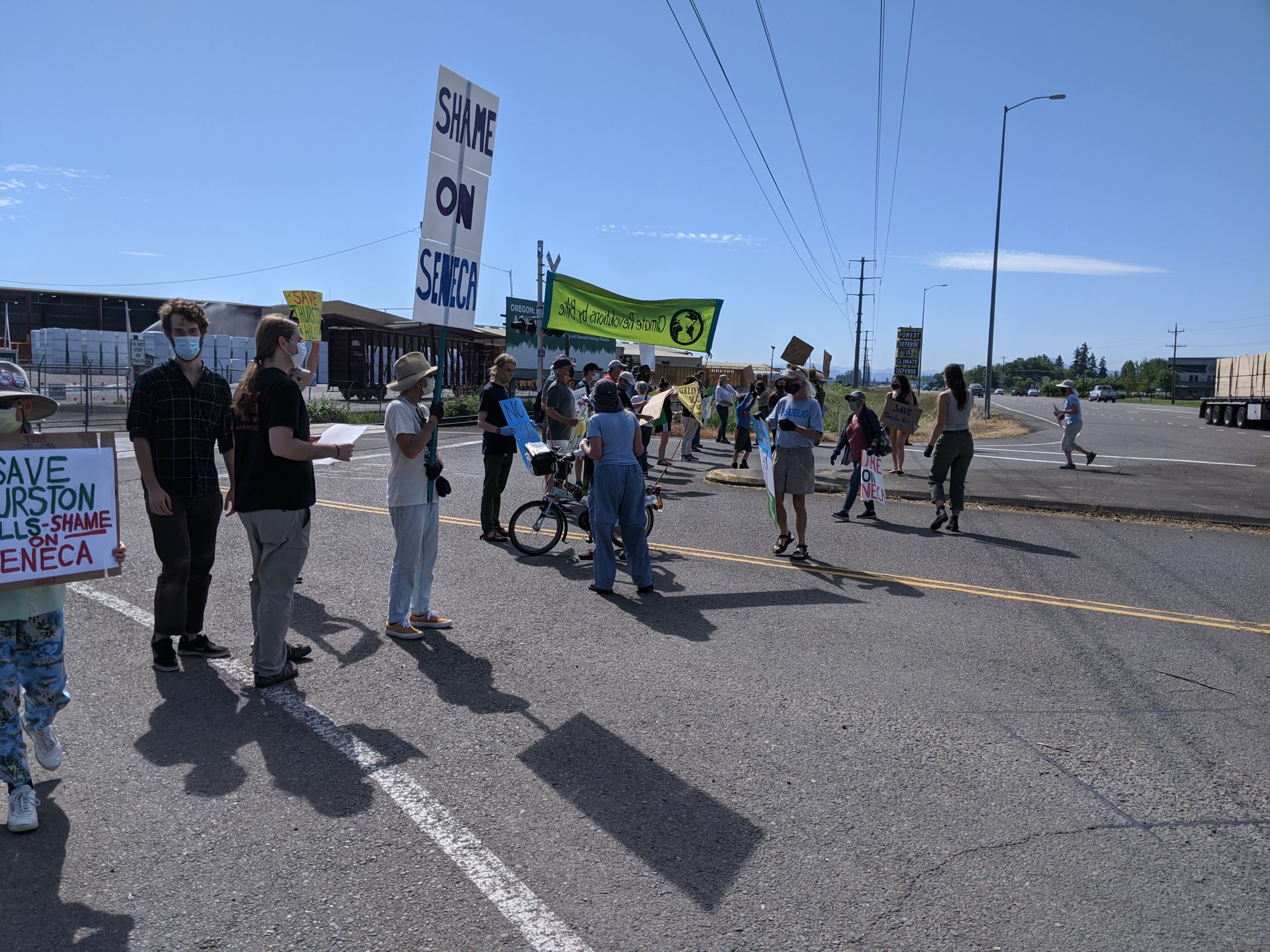Activists challenge the Thurston Hills timber sale with protest
The Bureau of Land Management has moved forward with the Thurston Hills timber sale despite community opposition from nearby landowners and Cascadia Wildlands, a grassroots conservation group in Eugene.
On May 28, activists gathered at Seneca Sawmill in Eugene to protest the sale of Thurston Hills, citing clear-cutting and subsequent increased risk of fire as their primary concerns.
According to Dylan Plummer, an organizer for Cascadia Wildlands, the group is opposed to the proposed timber sale “because it undermines the purpose of this forest as a local recreation area and puts the local community at increased risk of wildfire.”
Along with environmental concerns, BLM has received criticism for moving forward with the sale while the community continues to be impacted by COVID-19.
Plummer stated that Cascadia Wildlands is “also concerned that the project is being moved forward during a global health crisis in which the public’s capacity to monitor and provide input on the management of public lands is greatly reduced.”
Cascadia Wildlands has actively opposed the Thurston Hills timber sale since it was proposed in June 2018. Their activism includes organizing with local community members directly impacted by the project as well as increasing public awareness and support in engaging with the process surrounding the sale.
Plummer explained that for over a year, Cascadia Wildlands has been organizing public hikes, town halls and door-to-door canvassing to provide information regarding the impacts of the proposed sale.
“We also filed a legal challenge, which we won in September of 2019, halting the sale until the BLM re-proposed the project with minimal changes this past February,” Plummer stated. “Since then, we have continued working with Thurston area neighbors to raise awareness about the sale, and to provide comments to BLM.”
Now that BLM has made the decision to move forward with the sale, Cascadia is preparing to submit a legal protest. “It is very possible this sale will once again end up in the courts,” said Plummer.
“The fact that the BLM wants to heavily log the closest piece of public land to the Eugene-Springfield area and in the backyards of many local residents is truly disturbing,” he stated. “Increased risk of wildfire is just one of the many impacts that commercial logging inevitably will have on a community and an ecosystem.”
Casey Roscoe, Senior Vice President of Public Relations at Seneca Sawmill, has responded to criticism from Cascadia Wildlands by stating that the Thurston Hills timber sale is a part of a larger project called Pedal Power, funded and organized by the Bureau of Land Management. “This is a dynamic, beautiful plan that has been worked on for years,” she said.
Roscoe went on to say that Pedal Power includes a plan for developing recreation areas and paths in Thurston Hills as well as harvest. “BLM has a number of qualified people working on this project, including hydrologists, biologists and recreation specialists,” she stated. “The plan is to create a diverse natural wonderland, if you will.”
“There are very specifically two environmental groups who oppose this plan. I have not heard of any others,” Roscoe stated when asked about community opposition. “There are two groups that oppose this project and their financial streams come from people writing them checks because they think something horrible is going on. This is what they do. There are so many different environmental groups that actually do great things and we work with them. We do a number of things with them, including water projects and planting. Other groups pretty much do lawsuits and work from a different angle.”
“Cascadia Wildlands is specifically spreading misinformation. They know what they’re saying is incorrect. I mean, they have lawyers who work there, they know what they’re saying is incorrect. For instance, they’re saying this is a clear cut even though they know it’s not,” said Roscoe in response to criticism from the environmental group.
Roscoe went on to say that the type of logging intended for the Thurston Hills area is called a regeneration harvest, in which patches of timber will be cleared in strategic areas rather than clear-cutting the land in its entirety.
The U.S. Forest Service defines Clearcutting Regeneration as a “method in which varying numbers of reserve trees are retained to achieve goals other than regeneration. This method produces a two-aged stand in which varying numbers of reserve trees are not harvested. If a minor, live component is left for snag replacement, the method is considered a clearcut method rather than clearcut with reserves.”
“We’re looking at patches of, you know, twenty acres here or twelve acres there. Nobody would look at that and say ‘This is a clear cut,’” said Roscoe. “The BLM has not done a clear cut in over twenty-five years and Cascadia Wildlands knows that.”
“There wasn’t really a protest,” said Roscoe in regard to the events of May 28 at Seneca Sawmill, in which a small group of community members gathered at the entrance with signs.
“Cascadia Wildlands set up at Seneca at ten in the morning and the news media was already there,” she said. “Clearly they had already corresponded. They got the shots they needed and wrapped up in about thirty minutes. It wasn’t a protest. It was a photoshoot.”
Plummer went on to say that “The timing of this project is also incredibly troubling. The last thing that our community needs during a pandemic is a logging project that will increase the risk of wildfire, reduce community access to green spaces, and release carbon into the atmosphere.”
“There are dozens of community members actively organizing against this sale, from submitting comments earlier this year, to preparing formal legal protests after receiving the BLM’s decision from earlier this month,” explained Plummer.
The Torch reached out to the Bureau of Land Management for comment but has not yet received a response.



